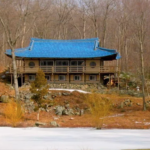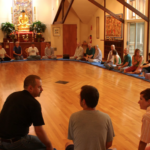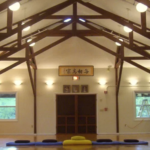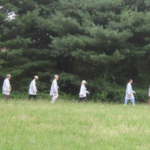Alison Bracken
The Providence Zen Center is centered in Cumberland, Rhode Island and was created in 1979. Founded by Korean Zen Master Seung Sahn, the Providence Zen Center was initially established in the apartment of a Buddhism professor at Brown University, who invited Seung Sahn to spread his knowledge on Zen Buddhism to students at the university. Seung Sahn gained a massive following throughout the first 7 years he was in America after his immigration in 1972, allowing him to create the Providence Zen Center. The temple itself was constructed by his students, who traded their labor for more knowledge and guidance. 6 years after the Providence Zen Center’s birth, Seung Sahn decided to channel his mastery into a new school of Buddhism called the Kwan Um School of Zen. The Kwan Um School of Zen now has 34 national centers and 57 international centers, but remains headquartered in Cumberland, Rhode Island.
As its name suggests, the Providence Zen Center affiliates with the Zen Buddhist tradition. Zen Buddhism was brought to Seung Sahn’s home country, Korea, in the 7th century CE, one century after it was introduced in China by the Indian monk Bodhidharma. Zen Buddhism places a heavy emphasis on the denial of materialism, which might explain its growing popularity in the West beginning in the 19th century. With the growing influence of western capitalism on industrialization, globalization, and urbanization, there has been a drastic rise in consumerism in the recent history of Western societies. Although the Zen Buddhist tradition has been denying the idea of materialism since its conception, the accessibility of international travel and global knowledge through technological advances worldwide in the last century has enabled Buddhists in the East to realize the need of Zen in the West and the travel to North America and Europe. Zen Buddhists believe that in order to delve into the mind, one must not concern themselves with material possessions but rather live a life of simplicity and introspection. The Providence Zen Center emphasizes this notion, situated in a less populated area of Rhode Island where those visiting or residing can enjoy the serenity of the environment and find peace within their spirits.
In addition, the Zen Buddhist tradition emphasizes that the path to enlightenment involves finding the truth within oneself. On the main welcome page of the Providence Zen Center’s website is a section titled, “Zen is Understanding Yourself.” This section of the website aims to portray the main message of Zen through a story about the time when a student from Chicago arrived at the Providence Zen Center to speak to its founder, Seung Sahn. The student asked Seung Sahn, “What is Zen?” Seung Sahn replies, “all things in the universe – the sun, the moon, the stars, mountains, rivers, people, and so forth – have different names and forms, but they are all made from the same substance. The universe is organized into pairs of opposites: light and darkness, man and woman, sound and silence, good and bad. But all these opposites are mutual, because they are made from the same substance. Their names and their forms are different, but their substance is the same. Names and forms are made by your thinking. If you are not thinking and have no attachment to name and form, then all substance is one.” Essentially, this means that in order to practice Zen Buddhism, an individual must work toward inner stillness and silence, since our physical realities are constructed by the mind. In all forms of Buddhism, to achieve enlightenment means to change your perception of life in order to find truth and escape the infinite cycle of samsara. In Zen Buddhism specifically, changing this perception of life can only be done through a peaceful mind, and a peaceful mind can be kept through meditation in which one enjoys silence rather than continuous internal questioning. In other words, “Zen tries to free the mind from the slavery of words and the constriction of logic. Zen in its essence is the art of seeing into the nature of one’s own being, and it points the way from bondage to freedom. Zen is meditation.” Most mornings at the Providence Zen Center begin with 5:00am wake up, followed by 108 Bows at 5:15am, a morning bell chant followed by regular chanting at 5:45am, and then concluding with a 30 minute sitting meditation at 6:30am. The remainder of the day involves various lessons and different forms of meditation and chanting. As one can see, the Providence Zen Center, along with other Zen Buddhist Temples, places a heavy emphasis on meditation and inward reflection.
The Providence Zen Center has a constant flow of visitors and retreat-goers, therefore contributing to the dynamic ethnic composition of the community. Because of its location in Rhode Island and based on the photographs throughout the Providence Zen Center’s website, the majority of individuals are caucasian. The Cumberland center also has a constant population of monastics in the Diamond Hill Monastery, which is the heart of the Providence Zen Center. The Diamond Hill Monastery is open to both male and female monastics, and again, according to the photographs throughout the Providence Zen Center’s website, the majority of monastics are caucasian as well.
The Providence Zen Center has a strong relationship with other western and Asian communities due to the nature of Seung Sahn’s personal upbringing and life course. Because the Providence Zen Center is the headquarters for the Kwan Um School of Zen, it follows the teachings established within this school of thought by Seung Sahn. Seung Sahn’s form of Zen Buddhism incorporates a beautiful blend of Korean influence as well as western influence. Because the Providence Zen Center is in close proximity to several prestigious universities, including Brown University, the Rhode Island School of Design, the University of Rhode Island, Johnson and Wales University, and Wheaton College, the community at the temple works closely with religious groups on each of the campuses, especially other Asian religious and cultural organizations. In addition, the Providence Zen Center hosts Christian-Buddhist retreats to encourage inter-religious dialogue, demonstrating its loving and open connection to major religions in the west. Finally, members of the Providence Zen Center and Kwan Um School of Zen are frequently invited to give lectures on Zen Buddhism at local churches and schools. Clearly this Zen Buddhist temple practices what it preaches, true peace and loving kindness, as seen by its relationship with the community.
As discussed earlier, the members of the Providence Zen Center view the central issues of Buddhism to be the importance of meditation, chanting, and bowing. Although the vitality of mediation is fairly well understood amongst the Buddhist community, chanting and bowing 108 times each morning can be difficult for newcomers to Zen Buddhism to understand. Seung Sahn explains that “chanting is very important. At first you won’t understand. But after you chant regularly, you will understand. ‘Ah, chanting-very good feeling!’ It is the same with bowing 108 times. At first people don’t like this. Why do we bow? We are not bowing to Buddha, we are bowing to ourselves. Small I is bowing to Big I. Then Small I disappears and becomes Big I This is true bowing. So come practice with us. You will soon understand.” The physical practices and traditions of chanting and bowing are a mechanism for the practitioners to quiet their minds. Similar to the physical practice of yoga in Hindu religious traditions, movement within the body through chanting and bowing helps to form breath and focus within the mind.
If one is interested in visiting the Providence Zen Center on a retreat or to pursue a monastic life in the beautiful nature of Cumberland, Rhode Island, the website immediately below this has all of the relevant information. Aside from the Diamond Hill Monastery, the Providence Zen Center contains a large dharma room, a smaller dharma room, a kitchen and dining room, 25 resident and guest rooms, several lounges, administrative offices, a gift shop, a small pond, a vegetable garden, and a small fruit orchard. Those in the local community have the ability to visit for daily meditation and different classes anytime free of charge, but purchasing a membership enables the Providence Zen Center to fund upkeep and benefits the permanent residents at the Diamond Hill Monastery. In addition, those outside of the Providence area are able to schedule silent group retreats, one day retreats, chanting retreats, inter-religious retreats, solo retreats, or the biannual Kyol Che retreat which is much longer and more immersive than the other retreats.
Overall, the Providence Zen Center is a thriving Zen Buddhist Temple that engages with the community, encourages education, and welcomes all visitors on a daily basis. With the help of 20th century advances, Korean Zen Master Seung Sahn was able to travel to America to spread his passion for this religion and knowledge of the truth, using the Providence Zen Center as a vehicle for this dispersion.
The Home Website for the Providence Zen Center
The Pluralism Project: Background Information on the Providence Zen Center




